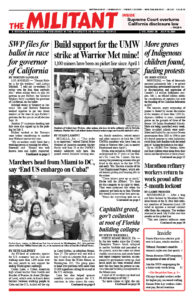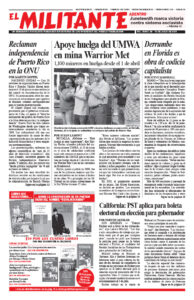An important victory for political rights was won July 1 when the U.S. Supreme Court ruled 6-3 to overturn a California regulation requiring tens of thousands of charities there to hand over lists of donors to state officials.
The decision strengthens the right to freedom of association and privacy without interference by the state, as guaranteed by the First Amendment to the Constitution. The ruling also opens up possibilities for striking down financial disclosure laws in other arenas, regulations aimed foremost at the union movement and working-class political parties like the Socialist Workers Party.
“California’s disclosure requirement imposes a widespread burden on donors’ associational rights,” writes Chief Justice John Roberts for the majority of the court, “and this burden cannot be justified on the ground that the regime is narrowly tailored to investigating charitable wrongdoing, or that the State’s interest in administrative convenience is sufficiently important.”
“Each governmental demand for disclosure brings with it an additional risk of chill,” Roberts adds.
The case was filed by the Americans for Prosperity Foundation — set up and financed by conservative political activists Charles and David Koch — and the Thomas More Law Center. A decade ago the state demanded that these charities, along with many others, hand over to the attorney general their top donors’ names, addresses and the amounts they contributed.
Kamala Harris, who served as California’s attorney general in 2014, insisted they would protect this information from public disclosure. But despite such promises, over 1,800 contributor lists were posted on the attorney general’s website.
After a federal district court in California ruled against disclosing donors’ names in 2016, California’s Democratic Party officials appealed. The decision was reversed two years later by the 9th Circuit U.S. Court of Appeals. The Supreme Court has now overruled this.
Nearly 300 organizations, with a wide variety of political views, signed friend-of-the-court briefs in support of the plaintiffs’ fight to defend constitutional rights. They included the American Civil Liberties Union, NAACP Legal Defense and Education Fund, Council on American-Islamic Relations, Cato Institute, National Association of Manufacturers and People for the Ethical Treatment of Animals.
The NAACP set a landmark legal precedent against disclosure laws being used to target political groups. During the rise of the Civil Rights movement in the 1950s, the Jim Crow state government in Alabama passed a law ordering the NAACP to hand over the names and addresses of all its members. The NAACP refused, saying it would subject them to attack, and fought this all the way to the Supreme Court. It won.
This victory set a precedent for the SWP to fight and win protection from having to turn over the names of contributors to its election campaigns. Unions like the Washington State Federation of Teachers and its affiliates have fought state laws there that demand union membership lists and make them available to anti-union forces that request them.
In a concurring opinion, Justice Clarence Thomas said he’s skeptical that any disclosure regulations are constitutional. “Laws directly burdening the right to associate anonymously, including compelled disclosure laws, should be subject to the same scrutiny as laws directly burdening other First Amendment rights.”
Liberals raise a hue and cry
The ruling elicited a cry of outrage from liberals on the Supreme Court and in the media. Justice Sonia Sotomayor, who wrote the minority opinion, slandered the plaintiffs and others like the NAACP and the SWP who challenge forced disclosure laws. She said the decision “marks reporting and disclosure requirements with a bull’s-eye. Regulated entities who wish to avoid their obligations can do so by vaguely waving toward First Amendment ‘privacy concerns.’”
NPR’s Nina Tottenberg complained, “Even more important could be the effect on federal and state laws that require public disclosure of the names of campaign contributors.”
‘Decision creates openings’
“This court decision is an important new defense of freedom of speech and association and the right to privacy,” said John Studer, Socialist Workers Party national campaign director. “It creates openings for — as the liberals fear — stepping up the fight to eliminate election campaign finance and other disclosure laws, which target unions and those seeking to chart a course toward independent working-class political action like the Socialist Workers Party.”
For decades SWP candidates have waged a fight for exemption from having to turn over contributors’ names to the government. In 1973 the party launched a political campaign and court suit that over 15 years exposed decades of FBI spying and disruption, winning a court ruling ordering the FBI to cease and desist. Using evidence exposed through this fight, the party won exemption from campaign finance disclosure requirements that held from 1974 to 2017.

